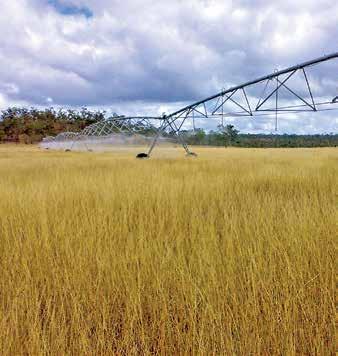
3 minute read
Knuth wants action on feral pigs
MEMBER for Hill Shane Knuth has hit out at the Queensland Government for “falling asleep on the job” when it comes to eradicating feral animals, despite continual calls to action from the Katter’s Australian Party, local councils and property owners in North Queensland.
His comments followed the announcement by Federal Environment Minister Tanya Plibersek that culling of feral animals were being ramped up, as populations had gone “through the roof” since aerial culling was halted in Kakadu National Park in 2019.
“No kidding. They finally realise what we have been warning both governments about for more than a decade,” Mr Knuth said.
“We have 130,000 square kilometres of National and State parks in Queensland, which takes up about 7.5 per cent of the total land area in the state, yet we are severely undermanned, underfunded and held back by bureaucratic red tape, when it comes to dealing with feral pests.
“The KAP has been very vocal on this issue and have constantly called on the State Government to immediately implement a number of measures to tackle the massive threat feral pigs pose to the environment, the great barrier reef, turtle and cassowary populations and the agriculture industry.”
In 2020, a study by Australia Pork was conducted as part of the Federal Government’s Feral Pig Action Plan.
Study coordinator Dr Heather Channon stated that 70 per cent of feral pigs needed to be culled annually to keep the population size from expanding. She also said that if culling of feral pigs stopped there would be an increase of up to 85 per cent in the feral pig population each year.
“There is no chance we are culling 70 per cent of feral pigs each year. We would be flat out culling half that number,” Mr Knuth said.
“If numbers are not kept in check, we will continue to see widespread devastation to all farming industries, the continued spread of Panama (TR4) and destruction to native fauna and flora.”

Mr Knuth also pointed to research from the University of Queensland in 2021, which revealed the environmental threat from feral pigs was far greater than previously thought.
The research showed that by uprooting carbon trapped in soil, it is estimated feral pigs are causing emissions to the equivalent of more than 1.1 million cars globally each year, with the bulk coming from Australia and New Zealand, who have massive feral pig populations.
Lead author of the study, Dr Christopher O'Bryan, believed this was a conservative estimate and could be three to four times higher.
“This research verifies what the KAP has been saying for years,” Mr Knuth said.

“Feral pigs have absolutely zero positive impacts on the environment. It is difficult to understand why so little is being spent by both the State and Federal governments to eradicate this invasive pest in our state.”




He said old estimates show that over 24 million feral pigs inhabit Australia, with a large chunk located in North Queensland, however this was likely to be substantially more as feral pigs produced two litters of up to 4-10 piglets per year.
“We have more feral pigs in this country than humans and they are causing uncontrolled environmental damage,” he said.
Mr Knuth said the KAP has fully backed recreational hunters to be able to apply for permits to access national and state parks.
The KAP has also lobbied for bounty and aerial pig shooting programs, farmers to access grants and a substantial increase in funding for more indigenous rangers to combat feral pigs.
“Right now, recreational hunters are our last line of defence. They hunt feral pigs on their own time and money, while the State Government ignores every funding proposal and advice we have presented,” Mr Knuth said.
“This research should be a wakeup call to our State and Federal governments.
“If they don't listen, they will be responsible for turning a blind eye to one of the biggest and longest running environmental disasters in our state’s history.”
Avocados Australia believes that Australia’s proximity to the Indian market is very favourable when compared with their competitors.

The Australia-India Economic Cooperation and Trade Agreement (ECTA) entered into force on 29 December 2022 and, with it, came the new trade opportunity for the Australian avocado industry.
“The recently agreed tariff reductions for Australian avocados also strengthens our competitive position in this market,” Mr Tyas said.
“Avocados Australia believes that access to this large and growing market will bring renewed optimism for many Australian avocado growers.”
Mr Tyas commended the Australian Government on its efforts in achieving the outcome for the Australian avocado Industry.
“The Australian Government has worked very hard and closely with industry to achieve a commercially viable and workable protocol that all Australian Hass avocado growers will be able to use,” he said.
“Avocados Australia would also like to acknowledge the efforts of industry players who have supported the government through this process.”









